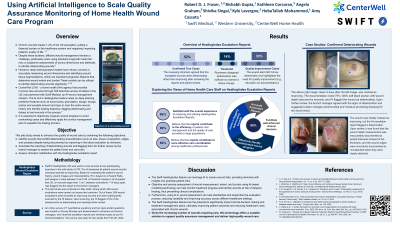Clinical Research
(CR-022) Using Artificial Intelligence to Scale Quality Assurance Monitoring of Home Health Wound Care Program
Thursday, May 16, 2024
7:30 PM - 8:30 PM East Coast USA Time

Rishabh Gupta, PhD – Head of AI in Research & Development, Swift Medical Inc.; Kathleen Corcoran, BSN, RN, CWOCN, CHRN – AVP Wound care and Research, CenterWell Home Health; Kyle Lavergne, PhD – VP of Clinical Programs, CenterWell Home Health; Angela Graham, RN; Shivika Singal, RN – AVP Clinical Systems & Innovation, CenterWell Home Health; Amy Cassata, RN, WCC – Senior Vice President Clinical Success, Clinical Success, Swift Medical Inc.; Heba Tallah Mohammed, PhD – Associate Director Evaluation and Research, Swift Medical Inc.
Introduction: Increase in chronic wound prevalence across the US continues to place pressure on home health (HH).1 Patients with a wound admitted to a home health program experience the highest rates of rehospitalization.2 Leveraging a digital wound care solution (DWCS) for these patients is associated with improved healing times3 and more efficient wound care documentation.4 DWCS enables organizations to use artificial intelligence (AI) to help screen clinical data and identify risk.
Methods: A quality improvement project was launched in January 2021 using AI. The HealingIndex was used to identify wounds with deteriorating characteristics (eg, size, tissue composition, edges, exudate) that were documented as improving by clinicians at the most recent evaluation. Acting as automated documentation review, wound evaluations were flagged to branch managers to review the patient chart and care plan. To evaluate clinician satisfaction, a survey was developed and included in the study.
Results: The use of the HealingIndex Escalation Report will be reported on using clinician feedback. Clinicians’ understanding of the HealingIndex report, their satisfaction with the escalated cases, and impact on their wound care program will be discussed. Early feedback noted the reports identified opportunities for quality improvement (eg, clinician education on documentation) and provided a useful review of changes that warranted additional review.
Discussion: DWCS can enable the use of AI to help with screening data that could inform clinicians of possible risks to patients. Considering the growing number of wounds requiring care, this technology can provide a scalable solution supporting quality assurance management and high-quality wound care.
Methods: A quality improvement project was launched in January 2021 using AI. The HealingIndex was used to identify wounds with deteriorating characteristics (eg, size, tissue composition, edges, exudate) that were documented as improving by clinicians at the most recent evaluation. Acting as automated documentation review, wound evaluations were flagged to branch managers to review the patient chart and care plan. To evaluate clinician satisfaction, a survey was developed and included in the study.
Results: The use of the HealingIndex Escalation Report will be reported on using clinician feedback. Clinicians’ understanding of the HealingIndex report, their satisfaction with the escalated cases, and impact on their wound care program will be discussed. Early feedback noted the reports identified opportunities for quality improvement (eg, clinician education on documentation) and provided a useful review of changes that warranted additional review.
Discussion: DWCS can enable the use of AI to help with screening data that could inform clinicians of possible risks to patients. Considering the growing number of wounds requiring care, this technology can provide a scalable solution supporting quality assurance management and high-quality wound care.

.jpeg)